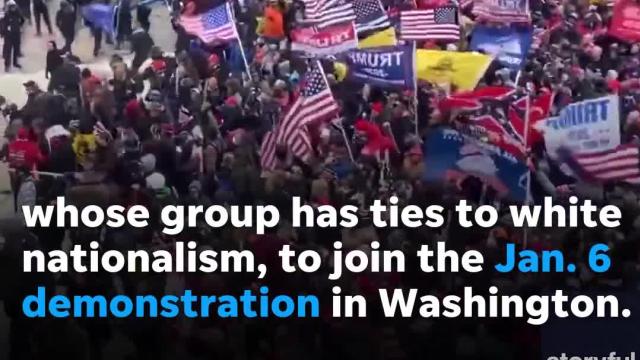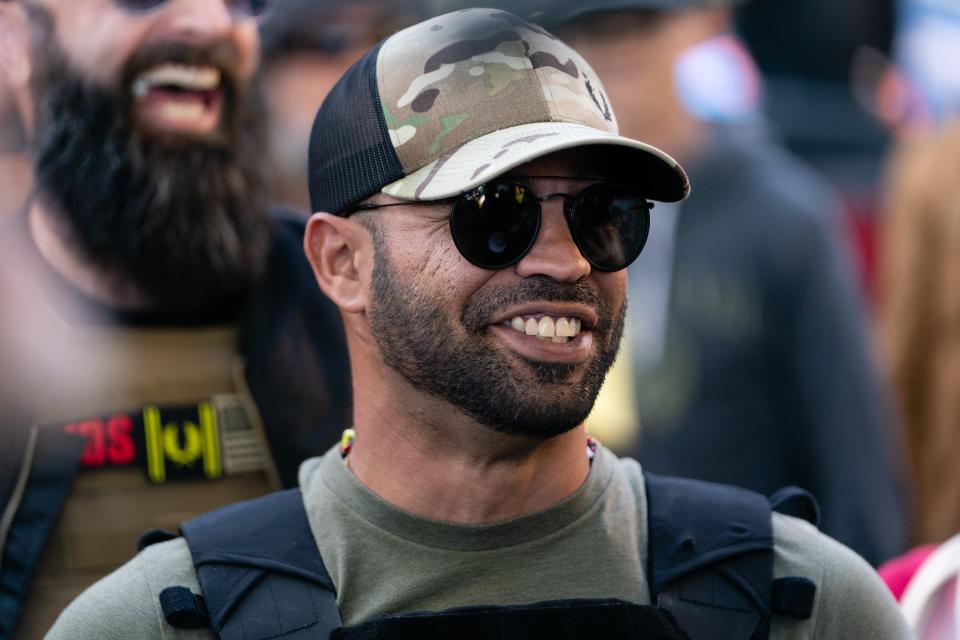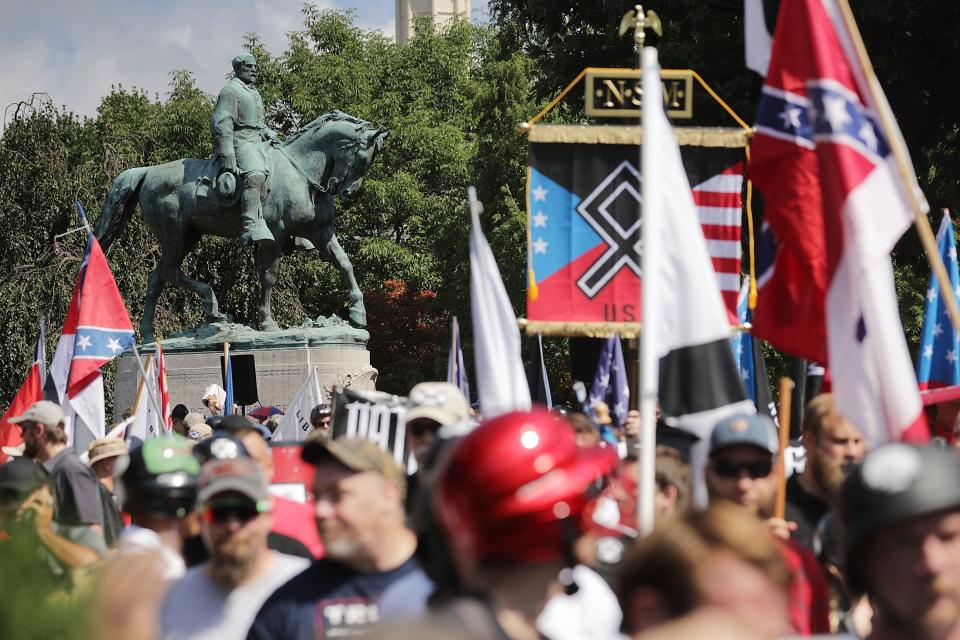Proud Boys splintering after Capitol riot, revelations about leader. Will more radical factions emerge?

The Proud Boys are having a rough time. The self-described "Western chauvinist" drinking club has long been a refuge for white supremacists, anti-Semites and assorted extremists seeking a veneer of legitimacy.
But in the wake of the violent insurrection at the U.S. Capitol last month, the group is in some disarray, as state chapters disavow the group's chairman and leaders bicker in public and in private about what direction to take the Proud Boys in.
Proud Boys chairman Henry Tarrio, who goes by Enrique, was arrested days before the Capitol riot and charged with two federal weapons charges. Three weeks later, Tarrio was outed as a longtime FBI informant, a role he has now admitted to. The news about the Proud Boys leader came as other members of the group were arrested for their involvement in the violent insurrection at the U.S. Capitol on Jan. 6. Then, on Feb. 3, Canada designated the Proud Boys as a domestic terrorist group.
More: 5 charged with conspiracy in Capitol riots; at least 2 associated with Proud Boys leaders
The barrage of controversy, discord and betrayal seems to have been too much for at least three state chapters of the Proud Boys, who used the messaging app Telegram to denounce Tarrio and proclaim their independence from central Proud Boy leadership. That raises questions about the future of the group, and also has experts concerned about more radical factions of the Proud Boys, or a newly-branded gang, emerging.
"We do not recognize the assumed authority of any national Proud Boy leadership including the Chairman, the Elders, or any subsequent governing body that is formed to replace them until such a time we may choose to consent to join those bodies of government," read an announcement on a website connected to the Alabama chapter of the Proud Boys.
The same sentiment was shared on Telegram by Proud Boys chapters in Indiana and Oklahoma.
"They're radioactive now," said Daryle Lamont Jenkins, executive director of the One People's Project, who has been exposing far-right extremists for three decades. "Any air of respectability is gone. They can no longer say that they were being misrepresented by the liberal media as extremists, because people are now looking at them and just saying, 'You're dirty.'"
Jared Holt, a fellow at the Atlantic Council's Digital Forensic Research Lab who studies extremism, agreed. He noted that the most popular Telegram channel used by members of the Proud Boys was recently renamed, removing the Proud Boys moniker altogether.
"The Telegram channel dropping the name, different chapters breaking off from the national leadership, it all speaks to a rift that’s occurring in the Proud Boys," Holt said. "That brand has become too toxic."
Tarrio did not respond to calls for comment.
More: Proud Boys suspects face most serious capitol charges

Where will departing Proud Boys go?
Experts who monitor the Proud Boys agreed the group is undergoing the sort of transition that happens to most hate groups at some point.
"Extremist groups very frequently split, or people will abandon these groups when the leadership behaves in ways that aren't in keeping with the stated values of the organization," said Brian Hughes, associate director of the Polarization and Extremism Research and Innovation Lab at American University. "Those splits are inevitable because exploitation, abuse and informing to law enforcement just go with the territory."
The question now is where members of the Proud Boys will go.
Proud Boys chapters that have so far denounced Tarrio have not completely turned away from the group. They say they will operate as independent Proud Boys organizations that won't take orders from a central leadership.
But different personalities within those chapters represent radically different versions of how the Proud Boys brand might survive and morph into the future.
According to the Southern Poverty Law Center, the leader of the breakaway Proud Boys chapter in Indiana, William Brien James, is a longtime violent white supremacist who co-founded a neo-Nazi drinking club in 2003. In an interview, James claimed he left the white supremacist movement 10 years ago, but Jenkins and other experts doubt his sincerity.
"I'm watching that guy really closely," Jenkins said.
'We are coming for them': Feds charge West Coast Proud Boys leader in Capitol riot

In St, Louis, the Proud Boys chapter leader Michael Lasater said his group wants to get back what he said were the founding principles of the Proud Boys: "brotherhood and beer."
The St. Louis Proud Boys are still figuring out where they stand vis-à-vis Tarrio and central leadership, Lasater said, but they want to get away from the "political stuff" — rallies and street brawls with Black Lives Matter and anti-fascist activists.
Jenkins, who has watched extremist groups fragment and reform many times over the years, said he expects more radicalized groups to emerge from the breakup of the Proud Boys. While some people will leave the movement, he predicted the core members will keep reinventing themselves into ever-more-nuanced versions of the same fundamental concept.
"The critical mass will stay the same," Jenkins said. "It’s still the same people with the same motivations and same agenda, and that’s why we will continue to follow them."
Whitewashing their past
The schism within the Proud Boys likely doesn't just represent a lack of faith in Tarrio or a desire to change the group's direction, said Amarnath Amarasingam, associate fellow at the Global Network on Extremism and Technology. He believes it also reveals a sense of fear within the organization.
"Jan. 6 was a major turning point," Amarasingam said. "Seeing their friends getting arrested will have been a major shock to the system for people who just wanted to go out and get drunk and brawl."
In the wake of the clampdown on the Proud Boys, its members have a vested interest in whitewashing their past, Jenkins said.
The last few months have revealed the Proud Boys for what they really are, Jenkins said: a dangerous, largely racist domestic hate group masquerading as a bunch of guys who just want to get drunk, say edgy things and have fun. The concept of "Western chauvinism" is really just code — a dog whistle to other white supremacists, he said.
"They weren’t really ever fooling anyone, but now everybody sees what we’ve been talking about," Jenkins said.

So, when members of the Proud Boys post messages denouncing Tarrio or the direction the gang has taken, that likely also represents an effort to distance themselves from an organization that is now squarely in the sights of law enforcement and anti-fascist activists.
Chapter presidents can argue they want to break away to return to their original mission as a drinking club, but experts on extremism aren't buying it.
Hughes said there's only one true exit strategy for Proud Boys who find themselves in an organization whose values they don't endorse: Leave the movement entirely, just as thousands of neo-Nazis, skinheads and assorted extremists have done for decades before them.
"These groups are chock-a-block full of power struggles, petty tyrants and snitches," Hughes said. "That said, there's always hope for people. When you look around yourself and you see that you're surrounded by these would-be führers, who don't actually have any principles beyond their own aggrandizement, well maybe that's an opportunity for people to start checking themselves."
This article originally appeared on USA TODAY: Proud Boys splinter after Capitol riot, Enrique Tarrio revelations